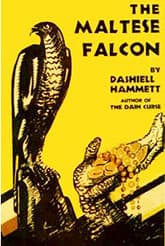The Maltese Falcon
Critique • Quotes • At the movies
 First edition
First editionFirst publication
1930
Literary form
Novel
Genres
Mystery, crime
Writing language
English
Author's country
United States
Length
Approx. 84,000 words
Low brow, high morality
Everyone who loves classic film noir knows the complicated storyline from the 1941 flick starring Humphrey Bogart. The Maltese Falcon involves intrigue among shady, eccentric characters to find a black bird made of gold and jewels. And a femme fatale who bewitches our hero, the private investigator Sam Spade.
But for Spade, particularly in the book, the most important task is to discover the murderer of his partner Miles Archer, who was bumped off near the beginning of the case, and to bring the killer to justice.
The novel is also Dashiell Hammett at his best. Every scene is alive, accomplished with a minimum of description, with only action and plain, sharp dialogue. Every character is realized without much—or any—background exposition.
Hammett has the ability to have his characters take actions that surprise the reader, yet immediately seem natural. As if they would have been predictable if we'd only understood them well enough.
The wrap-up chapter especially presents Spade's (Hammett's) code of personal honour and justice within the cynical milieu typical of hardboiled detective fiction, a genre that Hammett himself practically invented.
With this novel, Hammett established the figure of the jaded private eye firmly in the popular imagination and set the standard that generations of crime writers have ever since tried to reach or surpass.
But The Maltese Falcon is interesting also for the growth of Hammett's writing from being about a tough guy to being about a tough guy with a higher moral sense. It's the first novel in which Hammett uses the third person and in which he gives his detecting protagonist a name. (His previous two novels and many of his stories were narrated in the first person by a "Continental Op".)
And he develops Spade's character—and that of anyone around him—entirely behaviouristically. That is, he never gives anyone's thought or feelings, just relates what they do or say and sums up their appearance succinctly. (Spade himself "looked rather pleasantly, like a blond satan.")
With a sharp, objective eye and without sentimentality.
A higher code
Which is not to say there's no sentiment to The Maltese Falcon. The novel is awash in greed, fear, pride, anxiety, euphoria, even love. Or rather the reader is—for the feelings are all inferred from the interaction of the characters, never spelled out in the text.
At least not until that famous final dialogue Spade has with his lover when he calls upon a higher morality than personal feeling. Cynical and honourable at the same time.
It's all quite a tour de force and a milestone in distinctly American crime fiction, perhaps in American fiction in general.
And, all that aside, The Maltese Falcon is just a great, exciting read.
— Eric
Critique • Quotes • At the movies

